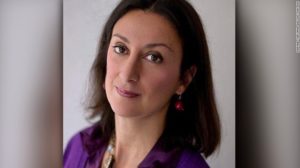Report from Malta on murder of Panama Papers journalist Daphne Caruana Galizia
Author: Malcolm Naudi
A former Chair of the Institute of Maltese Journalists (chaired the Institute for 14 years consecutively from 2001 to 2014). Former Deputy Editor of the Sunday Times of Malta.
The brutal murder of the Maltese journalist Daphne Caruana Galizia, killed by a bomb planted in her car, caused shock around the world, not just among the journalism fraternity but also in political circles, especially around Europe. Wikileaks founder Julian Assange offered a €20,000 reward for information leading to the conviction of
her murderer.
Daphne had a mighty pen. She wrote flowing, well-structured prose that bit to the bone. Frighteningly frank, she was not afraid to get personal on her subjects. She tested the boundaries of the Press Law, going beyond what many would tolerate, and faced countless actions for libel by politicians and individuals who felt offended.
She was adored by many, but hated and feared in equal measure. She revealed so much that would otherwise never have seen the light of day – and in consummate detail. Face to face, she was soft-spoken and almost shy. She was three years younger than me and grew up in the same street as my wife, who remembers going to feed tortoises and hedgehogs in the garden of her house.
I edited her work when I was Acting Editor of the Sunday Times of Malta early in her career. I distinctly remember when I had to remove a piece in which she commented on a matter that was sub judice. I was also in her sights when I was chair of the Institute of Maltese journalists for certain positions taken by the Institute that she did not agree with. Apart from her Running Commentary blog, which she started in 2008, she had two columns a week in the daily and Sunday editions of the Malta Independent newspaper, apart from editing a glossy magazine, Taste & Flair. Daphne had a formidable network of informers and was the local journalist who, single-handedly: released the local data from the Panama Papers, accusing then Energy Minister (today the Minister for Tourism) and the Prime Minister’s Chief of Staff of holding secret companies in Panama and trusts in New Zealand; • made allegations that the Economy Minister visited a brothel outside Duesseldorf with an aide while on an official visit to Germany;
• cited a whistle blower who claimed that the Prime Minister’s wife was the ultimate beneficiary of a Panama Papers company; and
• was a vocal critic of the opposition party leadership candidate, who went on to become the party leader, for what she alleged was his involvement in a “prostitution racket” in London and holding a bank account in Jersey in which the funds from the “racket” were deposited.
Hers is the first assassination of a journalist in Malta. She certainly had a highly influential blog (that invited readers to add their comments) and is credited with singlehandedly “convincing” the Prime Minister to go to the country last June, more than a year before the end of his five-year term. In 2017 she was listed by Politico magazine as the only Maltese among 28 Europeans “who are shaping and shaking and stirring Europe”.
The duty magistrate, who went on site after the bombing to initiate an inquiry, recused herself from the case after Daphne’s family filed a court application claiming she had a “flagrant conflict of interest”. The magistrate who has been appointed to conduct the inquiry, Anthony Vella, is said to be highly competent in this area.
Malta and journalism will never be the same again. There have been incidents of journalists being manhandled or threatened, but we have never seen anything like this. It looks like a Mafia-style contract killing, intended to silence the journalist definitively.
Source: Commonwealth Journalists Association
